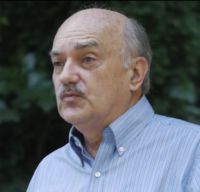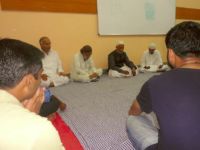Islamic scholars from all over the world join hands and ratify the Darul Uloom’s fatwa against terrorism. But will it provide tangible results? By Deevakar Anand
Uniting against terrorism More than 200 Islamic scholars from South Asia and Europe attended the two-day conference in Deoband
Deoband, a small town in Uttar Pradesh’s Saharanpur district, is located just 30 km from Muzaffarnagar, which witnessed the country’s deadliest communal riots in a decade, in September, leading to the deaths of 59 people and leaving more than 50,000 homeless. That is why it was extremely hard to miss the extra caution the most prominent ulemas — scholars of Islamic law — from India, Pakistan, other South Asian countries and the United Kingdom, took not to touch the “sensitive issue” of the Muzaffarnagar riots while attending a two-day conference on world peace in Deoband on 13-14 December.
More than 200 Islamic clerics met in Deoband and advocated “peace” without any discussion on the riots. Curiously, the bjp’s prime ministerial candidate for the 2014 General Election, Narendra Modi, who draws ire from the Muslim community for his alleged role in the 2002 Gujarat riots, too failed to find a mention.
On the first day of the conference organised by the Jamiat Ulama-i-Hind (JuH), when asked whether the Muzaffarnagar riots will figure in the discussions, JuH general secretary Maulana Mahmood Madani replied in the negative. “Instead of discussing a particular issue, we shall focus on the overall environment that leads to such incidents, not just in our country but across the world,” he said. “We want to discuss the larger issue and find ways to create an environment of trust between communities to prevent any such riots in the future.”
However, a day later, Madani couldn’t resist it anymore. At the concluding session of the conference at the Ramlila Maidan in New Delhi, he did lament the weakness of the Indian political class in preventing riots. “Leaders such as Mulayam Singh Yadav should realise that if they can’t ensure justice to humanity, they shall lose the right to rule,” said Madani, while addressing thousands of Muslims, including Islamic clerics. While pitching for the Communal Violence Bill, he warned that political parties and leaders incapable of promoting peace between communities will get “a befitting reply from the people when the time is right”.
On the topic of Modi, even though the clerics acknowledged off the record that he is a major factor in the discourse of Muslim politics, they did not bring his name up during the conference.
Prominent scholars who spoke at the event included Jamiat Ulama-i-Islam (Fazl) chief Maulana Fazlur Rahman from Pakistan, Mufti Mohammad Rizwe from Sri Lanka and Mufti Noor Mohammad from Myanmar.
A pro-Taliban leader and former leader of the opposition in the Pakistan Parliament, Rahman said that terrorism was not just the most pressing issue in Pakistan or Afghanistan but has gripped almost all the countries. “All of us, irrespective of our nationalities, need to come together and tackle the problem,” he said.
Other issues that found prominence among the leaders were continuing cooperation to facilitate the establishment of friendly relations at all levels, reconciliation and peace for the benefit and well Other issues that found prominence among the leaders were continuing cooperation to facilitate the establishment of friendly relations at all levels, reconciliation and peace for the benefit and wellbeing of humanity and mobilisation of people and making efforts to solve conflicts through peaceful means.
Advocating that no country or society can progress, prosper or enjoy peace unless the rights of minorities, poor people, weaker sections and women are safeguarded, the leaders declared that sectarian violence and bloodshed is totally anti-Islam.
“Islam holds chaos and disorder of all kinds, disharmony, bloodshed and targeting of innocent people as a most heinous crime. Therefore, we condemn vociferously all kinds of terrorism,” the ulemas said in a joint declaration. “In this respect, we fully endorse the anti-terrorism fatwas of the Darul Uloom, Deoband. We appeal to all the justice-loving people that they should not only denounce terrorism but also try to remove the causes and motives that breed terrorism.”
The Darul Uloom is one of the most influential madrasas in the world and is considered to be the nerve centre of the Deobandi movement, often identified with deeply conservative and controversial fatwas, especially against women.
However, the madrasa has played a major role in the Indian freedom struggle. Unlike some of the Deobandi groups in Pakistan that are involved in the violence in Kashmir and have been hardline supporters of a separate Islamic State and implementation of the sharia law in its conservative forms, the Darul Uloom has always distanced itself from terrorism, often issuing fatwas against it.
“Terrorism, minority rights and women’s rights are issues not just in the developing world, but also in the developed world. That’s why, a joint peace message by Islamic leaders from all over is needed,” said Darul Uloom vice-chancellor Maulana Abdul Qasim Nomani.
Some of the ulemas also underlined the need of modern education for the community’s children and called for a sincere attempt to help promote scientific temperament among Muslims. “It is our duty to try our best to remove ignorance, both temporal and religious,” said Madani. “We will take action to establish institutions to impart modern education in an Islamic environment.”
Added Mohamad Mukadam, who represents the Jamiat Ulama-i-United Kingdom, “We have to move away from the impression that we are aggressive, violent and lack scientific reasoning. Unfortunately, a section among us is identified with such sentiments. This impression has to be corrected. Islam, as a religion, encourages peace, non-violence, scientific temperament and brotherhood. Those who indulge in activities that are against the spirit of the religion and Islamic teachings are deviants and do not represent it.”
In a statement issued at the end of the peace conference, the JuH said, “The World Peace Forum has brought together the Maldives, Pakistan, Bangladesh, Myanmar, Sri Lanka, the UK, Nepal and the US to work in tandem towards mitigating terror. The forum will see Islamic organisations across the world create and establish critical initiatives against terrorism of all kinds, and assist each other towards this common purpose. We are responsible for establishing the environment of peace, and must move forward among our communities to implement this declaration of peace, fight against injustice and oppression. We want to create a world where there is no injustice and bloodshed.”
The Islamic clerics also appealed to all faiths to come together to fight against “crimes, immoral customs, extravagance, alcoholism, drug addiction, sexual exploitation, nudity and female foeticide”.
The World Peace Conference was part of the Silk Letter Movement Centenary Celebrations. Aimed at freeing India from British rule, the Silk Letter Movement started in Deoband in 1913 and was active until 1920. It caught the imagination of Muslims not just across India but support also poured in from Ottoman Turkey, Afghanistan and imperial Germany.
It is going to be extremely relevant and critical how this initiative shapes up in the coming weeks, months and years, considering the backdrop of world politics, terrorism and the role of Islamic fundamentalists.
“The message of peace and rationality in relationships of various communal groups that this conference has tried to convey and promote shall find attentive ears all over the world,” said Mufti Noor Mohammad, a cleric from Myanmar.
(Published in Tehelka Magazine, Volume 10 Issue 52, Dated 28 December 2013)



Leave A Comment
You must be logged in to post a comment.